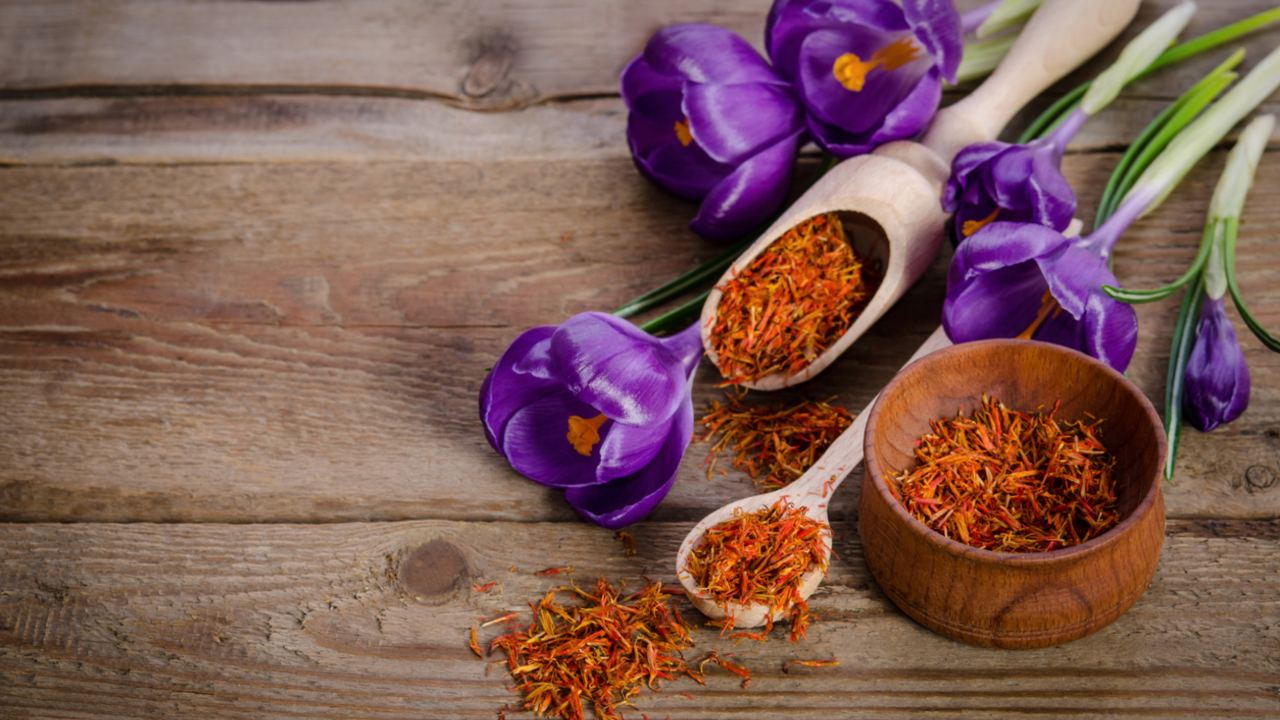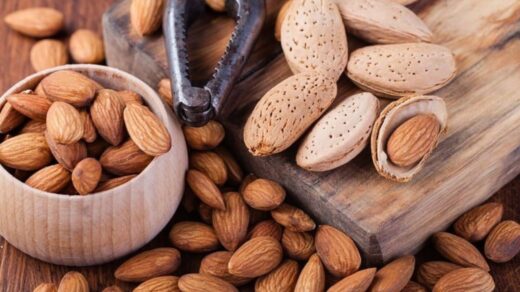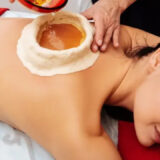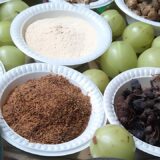Kesar (Saffron): Benefits, Nutrition, Dosage & Side Effects
Kesar, or saffron (Crocus sativus), is one of the most precious and revered herbs in Ayurveda. Known as Kumkuma or Keshara in ancient texts, saffron has been used for thousands of years in traditional medicine, culinary arts, and beauty rituals. 
Its vibrant crimson threads are handpicked from the Crocus flower, making it the world’s most expensive spice. In Ayurveda, saffron is classified as a Rasayana (rejuvenating herb), promoting longevity, vitality, and mental clarity.
It balances Vata and Kapha doshas but may aggravate Pitta in excess due to its heating nature. Modern research supports many of its traditional uses, highlighting its antioxidant, anti-inflammatory, and neuroprotective properties.
Ayurvedic Properties of Kesar (Saffron)
According to Ayurveda, every herb has specific properties (Guna), taste (Rasa), potency (Virya), and post-digestive effect (Vipaka). These determine how the herb interacts with the body’s doshas (Vata, Pitta, Kapha).
1. Rasa (Taste)
- Tikta (Bitter) – Detoxifying, supports liver health.
- Katu (Pungent) – Stimulates digestion and circulation.
- Madhura (Sweet) – Nourishing and calming.
2. Guna (Qualities)
- Laghu (Light) – Easy to digest.
- Snigdha (Slightly oily) – Provides lubrication to tissues.
3. Virya (Potency)
- Ushna (Heating) – Warms the body, enhances metabolism.
4. Vipaka (Post-Digestive Effect)
- Katu (Pungent) – Helps in clearing toxins (Ama).
5. Effect on Doshas
- Balances Vata – Relieves nervous system disorders, anxiety, and dryness.
- Balances Kapha – Reduces mucus, congestion, and sluggishness.
- May increase Pitta – Excessive use can cause heat-related issues like acidity or rashes.
List of Nutrients, Minerals & Vitamins in Saffron
| Nutrients and minerals per 100 grams | |
| Calories or energy | 310 kcal |
| Fat | 6 g |
| Carbohydrates | 65.37 g |
| Proteins | 11.43 g |
| Iron | 11.10 g |
| Calcium | 111 g |
| Fiber | 3.9 g |
| Match | 252 g |
| Magnesium | 264 g |
| Sodium | 148 g |
List of Vitamins in Saffron
| Values per 100 grams | |
| Vitamin C | 80.8 mg |
| Vitamin B6 | 1,010 mg |
| Vitamin A, RAE | 27 μg |
| Thiamin | 0,115 mg |
| Riboflavin | 0.267 mg |
| Folic acid | 93 μg |
Source: USDA
Medicinal Uses & Health Benefits of Kesar in Ayurveda
Saffron, known as Kesar in Ayurveda, is one of the most revered herbs for its wide-ranging therapeutic properties. Extracted from the flower of Crocus sativus, saffron is not only a culinary delight but also a powerful Ayurvedic remedy used for centuries to enhance vitality, mental clarity, reproductive health, and more.
1. Rasayana (Rejuvenation & Longevity)
Saffron acts as a Rasayana — a rejuvenative agent that supports:
- Cellular Regeneration: Promotes tissue repair and revitalization.
- Anti-Aging: Slows down the aging process and boosts vitality.
- Immune Support: Strengthens immunity and resistance to disease.
Traditional Ayurvedic Uses:
- Chyawanprash: Saffron is a key ingredient in this herbal jam known for enhancing youthfulness and strength.
- Ashwagandha-Kesar Milk: A nourishing tonic that builds stamina and combats fatigue.
2. Enhances Mental Health (Medhya Rasayana)
Saffron is a potent Medhya Rasayana, which enhances mental clarity and emotional well-being.
- Cognitive Support: Improves memory, concentration, and learning ability.
- Stress & Anxiety Relief: Acts as a natural antidepressant by boosting serotonin levels.
- Promotes Restful Sleep: A warm glass of saffron milk before bed calms the nervous system and induces sleep.
Modern Research: Clinical studies support saffron’s effectiveness in reducing symptoms of mild to moderate depression and improving mood balance.
3. Supports Reproductive Health (Vajikarana)
Traditionally classified under Vajikarana (aphrodisiac therapy), saffron promotes reproductive vitality.
- In Men: Enhances sperm count, motility, and libido.
- In Women: Regulates menstrual cycles and helps relieve PMS symptoms.
- Menstrual Pain Relief: Its antispasmodic properties ease cramps and abdominal discomfort.
4. Improves Digestion & Metabolism
Saffron helps balance Agni (digestive fire), aiding in digestion and nutrient assimilation.
- Digestive Stimulant: Encourages appetite and supports efficient digestion.
- Liver Detox: Facilitates bile production and liver function for natural detoxification.
5. Skin & Beauty Benefits
Saffron has long been a prized beauty elixir in Ayurveda.
- Brightens Skin: Reduces pigmentation and promotes an even, glowing complexion.
- Anti-Aging Effects: High in antioxidants that reduce wrinkles and prevent premature aging.
- Wound Healing: Antimicrobial properties support skin repair and prevent infections.
Home Remedy: Mix saffron with milk or honey and apply to the face for radiant skin.
6. Respiratory Health
Saffron alleviates respiratory conditions by balancing Kapha and clearing congestion.
- Cough & Cold Relief: A soothing remedy when combined with warm milk and turmeric.
- Asthma Support: Helps ease breathing by reducing mucus and inflammation.
7. Pain Relief & Anti-Inflammatory Effects
Its warming and soothing properties make saffron effective for pain management.
- Arthritis & Joint Pain: Saffron-infused oil massage reduces inflammation and stiffness.
- Muscle Relaxant: Alleviates cramps, spasms, and general muscular tension.
8. Cardiovascular Health
Saffron supports a healthy heart by improving circulation and reducing harmful inflammation.
- Regulates Blood Pressure: Contains potassium and antioxidant compounds that help maintain healthy blood pressure levels.
- Improves Blood Circulation: Acts as a mild blood thinner, preventing clot formation and enhancing oxygen delivery.
- Cholesterol Management: Helps reduce LDL (bad cholesterol) and supports heart function.
9. Eye Health
Ayurveda also recognizes saffron for its role in maintaining vision and eye strength.
- Improves Vision: Enhances retinal function and protects against age-related macular degeneration (ARMD).
- Reduces Eye Fatigue: Useful for those who strain their eyes through screen exposure or long reading hours.
- Antioxidant Protection: Carotenoids in saffron protect ocular cells from oxidative damage.
10. Hormonal Balance & Endocrine Support
Saffron helps stabilize hormone levels and supports the endocrine system.
- Balances Hormones: Beneficial in cases of hormonal imbalance in both men and women.
- Thyroid Support: May help regulate thyroid function due to its anti-inflammatory and adaptogenic effects.
- Menopausal Support: Eases mood swings, hot flashes, and irritability in menopausal women.
Ayurvedic Formulations & Remedies with Kesar
Saffron (Kesar) is widely incorporated into various Ayurvedic preparations, both for internal healing and external rejuvenation. These time-tested remedies enhance overall wellness, combining Kesar’s potency with other synergistic herbs and oils.
1. Internal Use Formulations
- Kesaradi Kashayam: A herbal decoction used primarily in managing respiratory disorders such as asthma, chronic cough, and sinusitis. It helps clear excess Kapha from the lungs and promotes easier breathing.
- Kumkumadi Tailam (as an ingestible formula variant): While traditionally used externally, in some classical texts and formulations, a purified internal form is also used for blood purification and supporting liver function. It is believed to enhance complexion from within and support detoxification when taken under supervision.
- Saffron Milk (Kesar Doodh): A classic nighttime tonic prepared by infusing saffron threads in warm milk.
Regular consumption is also said to boost Ojas — the vital life essence responsible for immunity and vitality.
2. External Applications
- Kesar Face Pack?: A traditional remedy for glowing and even-toned skin. With regular use, it helps reduce blemishes, acne scars, and early signs of aging.
- Kesar-Infused Herbal Oil: Infused in oils like sesame or coconut and used for Abhyanga (Ayurvedic massage). Its warming and aromatic qualities also help calm the nervous system and reduce Vata imbalance.
Dosage & Safety in Ayurveda
Saffron (Kesar) is a potent herb, and like all Ayurvedic substances, it should be used mindfully to harness its benefits without adverse effects.
Recommended Dose
- 1 to 3 strands per day (approximately 10–30 mg) is generally sufficient for daily use.
- It can be consumed with warm milk, water, or in herbal formulations as advised.
Precautions
- Do not exceed the recommended dose – overuse may aggravate Pitta dosha, leading to symptoms such as acidity, skin rashes, or excessive heat in the body.
- Avoid during high fever or active bleeding disorders, as saffron’s heating nature may worsen these conditions.
- Pregnant women should consult a qualified Ayurvedic practitioner before using saffron, especially in the first trimester, due to its uterine-stimulating properties in high doses.
Frequently Asked Questions (FAQs)
1. What will happen if I eat Kesar every day?
Eating a small amount of Kesar daily may improve mood, enhance skin, boost memory, and support overall wellness. However, excessive intake may lead to side effects like nausea, dizziness, or allergic reactions.
2. What is the disadvantage of saffron?
High doses of saffron can cause side effects such as dry mouth, drowsiness, anxiety, or even toxicity. It’s also not recommended for pregnant women in large quantities.
3. What is the best time to drink saffron?
The ideal time to consume saffron milk is at night before bed. It may promote better sleep, support digestion, and maximize its calming effects.
4. What are the proven benefits of Kesar?
Proven benefits include mood improvement, enhanced memory, PMS relief, antioxidant support, skin glow, and potential anti-inflammatory effects.
5. Who should not eat saffron?
Individuals who are pregnant, breastfeeding, or have bipolar disorder or bleeding disorders should avoid saffron unless advised by a healthcare provider.
6. How many strands of Kesar per day?
Consuming 3–5 strands daily is generally safe. Avoid exceeding 15–20 strands, as high doses may lead to side effects.
7. How much saffron is safe daily?
The safe daily dose is about 30–50 mg (approximately 3–7 strands). Doses over 1.5 grams may be toxic and should be avoided.
8. How much Kesar is in one glass of milk?
Typically, 3–5 strands are added to a glass of warm milk (200–250 ml) for health and flavor benefits.
9. What is the best way to consume saffron?
Soak 3–5 strands in warm water or milk for 10–15 minutes before drinking or adding to recipes. This enhances the release of its active compounds.
10. Is saffron a blood thinner?
Yes, saffron has mild blood-thinning effects due to its antioxidants. Those on blood thinners or with bleeding conditions should consult a doctor before use.
Kesar is a golden treasure in Ayurveda, offering holistic benefits for the mind, body, and skin. While highly effective, it should be used in moderation to avoid Pitta aggravation. Whether consumed as milk, applied as a face pack, or taken as a supplement, saffron remains a timeless remedy for health and beauty.

























